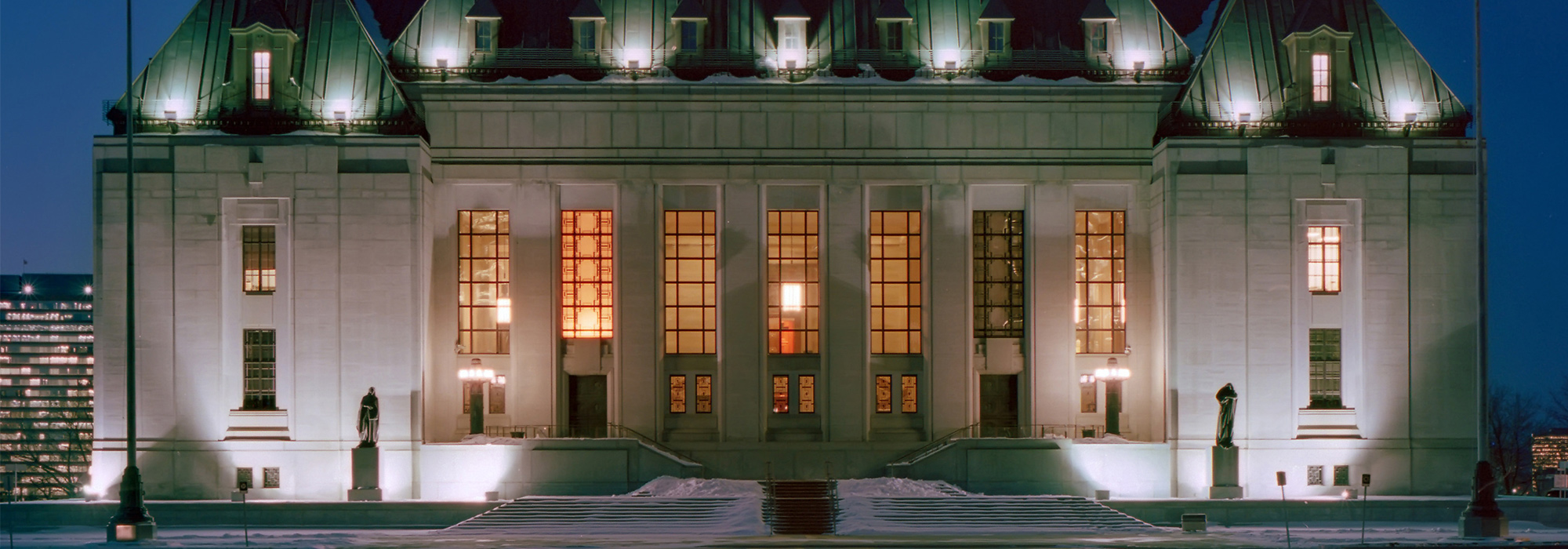
On May 20, 1999, the Supreme Court of Canada handed down its decision in M. v. H. The case centered on the obligation to provide financial support to common-law partners. The Court concluded that in order to avoid discriminatory application of the Ontario statute in question this obligation should be extended to same-sex common-law partners. As a result, the governments of Ontario and other Canadian provinces were obliged to amend their legislation to avoid similar constitutional challenges. What follows is an analysis of Bill 41, Manitoba’s response to this important decision. Although it was in strict compliance with the Supreme Court’s decision, in our view Bill 41 failed to embrace the spirit of the constitutional declaration embodied in M. v. H.
We begin with a discussion of the M. v. H. decisions. M. and H. lived together in a same-sex common-law relationship for approximately ten years. Upon the breakdown of the relationship, M. applied for spousal support and raised a constitutional question challenging the definition of “spouse” in section 29 of Ontario’s Family Law Act. The section’s effect was to allow support applications by opposite-sex common-law partners, but deny applications by same-sex partners.
The majority of the Supreme Court found that the provision in question discriminated on the grounds of sexual orientation, violating section 15 of the Canadian Charter of Rights and Freedoms. The Court further concluded that this infringement was not justifiable under section 1 of the Charter. Section 29 was thus declared to be unconstitutional and the government of Ontario was given six months to enact a new provision.
Given its strictest interpretation, the decision in M. v. H. deals only with the constitutionality of extending the right to apply for spousal support to same-sex partners in Ontario. Even so, other provincial governments have inferred from the Court’s decision an obligation to amend their own statues dealing with common-law spousal benefits. And it can be argued that, when the M. v. H. decision is given a broader interpretation, its spirit goes far beyond spousal support and creates a precedent for the examination of other statutes across Canada that accord rights, benefits or obligations to common-law partners. In fact, while the Court itself stressed the narrow application of its decision, hundreds of statutes across Canada have been amended in response to M. v. H.
The Court’s decision contained conclusions which, when applied to a broader range of situations, have more far-reaching effects than initially were obvious. For example, Cory J. stated “(t)he exclusion of same-sex partners from the benefit of s.29 of the FLA promotes the view that M, and individuals in same-sex relationships generally, are less worthy of recognition and protection. It implies that they are judged to be incapable of forming intimate relationships of economic interdependence as compared to opposite-sex couples, without regard to their actual circumstances.” While this statement focused on the economic interdependence of common law couples, it can be seen to reflect the broader assumption that same-sex partners form a less meaningful, permanent and significant union than opposite-sex partners. Justice Cory concluded that this assumption, which was evident in the wording of the legislation, violated the human dignity of individuals in same-sex relationships. It is a reasonable extension of this conclusion that legislative provisions denying same-sex partners rights or benefits granted to opposite-sex partners also violate the human dignity of individuals in same-sex relationships and are therefore unconstitutional.
Thus the spirit of the Court’s decision in M. v. H. is that any statutes drawing a distinction between opposite-sex and same-sex relationships may be open to constitutional scrutiny and should be amended to avoid any unconstitutional application. This broader significance has prompted the amendment of numerous statutes across Canada, but it has gone unrecognized, or perhaps ignored, in the province of Manitoba.
On May 30, 2001, Manitoba’s Justice Minister Gord Mackintosh introduced Bill 41, An Act to Comply with the Supreme Court of Canada Decision in M. v. H. The Bill amended ten provincial statutes, including those governing alimony, pension and death benefits, to include same-sex couples, to comply with the strict interpretation of the Supreme Court’s decision in M. v. H. But it fell well short of embracing the larger significance of the decision and failed to extend same-sex benefits beyond those explicitly ruled on in M. v. H.
One of the most notable omissions was the failure to amend Manitoba’s Adoption Act to allow same-sex couples to adopt. Under current law, joint adoptions, where both applicants will be legally recognized as the parents of the child, are allowed by a husband and wife or by a man and woman who are cohabiting as spouses. Thus, while any individual, including a homosexual, may apply alone to adopt a child, only opposite-sex couples may share legal parental status. As well, the Act states that so-called “second-parent” adoptions, in which an individual applies to adopt the child of his or her partner, are currently only available to “a person who is married to the parent of a child, or is cohabiting with the parent of a child and is of the opposite sex to the parent.” Minister Mackintosh’s explanation for not amending the adoption laws, as other provinces have done, was that, as reported by the Winnipeg Free Press, “in no way does M. v. H. say anything about children, parenting or adoption … [T]o bring in changes to adoption law under the guise of M. v. H. could allow Manitobans to accuse us of sneaking in legislation.”
Manitobans had a lot to tell the minister and other members of the Standing Committee on Law Amendments when it considered the proposed amendments in Bill 41. The vast majority of more than 60 witnesses criticized the minister for taking such a cautious stance on same-sex benefits and for failing to live up to the genuine spirit of the Court’s ruling in M. v. H. After much pressure, Minister Mackintosh announced that a panel would be established to study additional Manitoba statutes and report back to him. Thus, there would be no amendment to the Adoption Act or other statutes that currently discriminate against same-sex couples until at least the spring session of the Legislature in 2002.
To place Bill 41 in proper perspective, it is important to note how other jurisdictions have responded to the M. v. H. decision and to examine the current status of same-sex adoption in other provinces.
British Columbia has made the most advances in the area of same-sex rights. After the decision in M. v. H., the B.C. government introduced The Definition of Spouse Amendment Act, 1999, which expanded the definition of spouse in numerous provincial statutes. Now “spouse” includes individuals who have lived in a marriagelike relationship for two years, “including a marriage-like relationship between persons of the same gender.” B.C. has also made particular progress in its stance on same-sex adoption. As far back as 1996, the province amended its adoption legislation by removing from it any reference to the term “spouse,” which had been a barrier preventing couples of the same sex from applying for adoption. In B.C., there is no longer any explicit, or implicit, requirement that an applicant couple be of the opposite sex.
Ontario was the next province to respond to M. v. H., although it did so reluctantly. Ontario’s Bill 5, An Act to Amend Certain Statutes because of the Supreme Court of Canada Decision in M. v. H. amended a total of 67 provincial statutes that had been earmarked as containing potentially unconstitutional provisions. While the government’s news release stressed that it was acting only in response to the Supreme Court’s ruling, the government did go the extra step and amended many pieces of legislation that, though not ruled on by the Court, may have been subject to a constitutional challenge in the future. As a result of the Ontario amendments, same-sex couples are now allowed to adopt a child as a couple and individuals may also adopt the child of their same-sex partner—rights that in fact had been recognized at common law by an Ontario court as early as 1995.
Saskatchewan’s response to the decision in M. v. H. came in the form of Bill 48, An Act to Amend Certain Statutes Respecting Domestic Relations. The bill amended over a dozen pieces of provincial legislation to extend rights and benefits from traditional matrimonial relationships to a broader range of family units, including same-sex unions. The government of Saskatchewan, like the governments of B.C. and Ontario, went beyond the strict interpretation of the M. v. H. decision and improved same-sex benefits in relation to property, inheritance and adoption. Bill 48 amended Saskatchewan’s Adoption Act by replacing the definition of “spouse” with the following: —˜spouse’ means the legally married spouse of a person or a person with whom that person is cohabiting as spouses.” Although same-sex partners may now apply to adopt the children of their partner, the current wording of the Adoption Act does not allow for the incorporation of the new definition of “spouse” in relation to joint adoptions. While any person or persons may be considered by the court, the legislation implicitly prefers a married couple over an unmarried couple. Since this provision would restrict opposite-sex common law couples and same-sex common law couples alike, there is no discrimination on the basis of sexual orientation. However, this provision may be challenged by unmarried couples in the future.
The Alberta government also amended a number of statutes following the M. v. H. decision, including legislation governing adoption. Although the government has stated that it opposes same-sex adoption, the law was changed nevertheless.
The impact of the Supreme Court’s decision in M. v. H. has clearly been much greater than was first evident and has reached far beyond the strict interpretation of the ruling. Provinces across Canada have amended numerous laws to comply with the larger significance of the decision as it pertains to same-sex benefits and, specifically, the right of same-sex couples to adopt. But the progress made in other Canadian provinces is only one reason why same-sex adoption rights should have been addressed in Bill 41. There are other compelling reasons why the government’s failure to act is both disappointing and costly.
The most obvious is the inevitability of a constitutional challenge under the Charter and the overwhelming likelihood of its success. It is not a matter of if, but rather when a Manitoba couple will challenge the constitutionality of the province’s adoption legislation, and the ultimate outcome of such a case can hardly be in doubt. In 1995, an Ontario provincial court heard arguments on the constitutionality of denying same-sex adoptions. In the case of Re: K, four lesbian couples challenged the constitutionality of the definition of “spouse” used in sections of the Child and Family Services Act, which governs adoption in Ontario. One individual from each couple had applied for a “second-parent” adoption. Justice James Nevins found that, because the definition of “spouse” referred only to opposite-sex couples, “the applicants are denied their ‘day in court’ for no other reason than the fact that they are homosexual.” Concluding that “I cannot imagine a more blatant example of discrimination,” Justice Nevins ruled that the definition of “spouse” should be amended to include partners of the same sex. Although Ontario’s legislation was not amended until 1999, common law in Ontario had already determined that the denial of same-sex adoption rights was unconstitutional.
Another constitutional challenge regarding same-sex adoption rights recently succeeded in Nova Scotia. On July 9, 2001, a Nova Scotia provincial court ruled that the law preventing same-sex couples from adopting was unconstitutional. In the case in question, a lesbian couple who were already raising children claimed they were being discriminated against because the provincial legislation prevented both women from being recognized as legal parents of the children. Justice Deborah Gass found that “prohibiting a joint adoption where all the evidence indicates these adults are providing optimum care … defeats the very purpose of the legislation” and concluded that “the evolution of the concept of family and the importance of family to children … support the contention that this exclusion is unjustified.”
These two cases are a clear indication that the denial of benefits to same-sex couples is on very shaky constitutional ground. But in addition to these successful challenges, a number of other Supreme Court decisions lead directly to the conclusion that Manitoba’s Adoption Act may very well be unconstitutional. As Bonnie Macdonald explains in her 2001 book, Unequal Treatment of Same-sex Couples: Rights Denied:
Miron [Miron v. Trudel] says that cohabiting couples should not be excluded from rights and benefits that are enjoyed by married couples. Egan [Egan v. Canada] establishes sexual orientation as an analogous ground under section 15(1) [of the Charter], thereby prohibiting discrimination based on that characteristic. M. v. H. says that same-sex couples should not be excluded from rights and benefits that are enjoyed by cohabiting heterosexual couples. In effect, what these three cases are collectively saying is that same-sex couples should have equal access to the rights and benefits that accrue to married couples.
Macdonald’s assessment is that there is a strong trend in the Court to recognize and guarantee same-sex rights. It only strengthens the argument that Manitoba’s current adoption legislation could be successfully challenged.
There are numerous financial, personal and ethical costs related to Manitoba’s dragging its heels on the issue of same-sex adoption. A Charter challenge will mean a large outlay of taxpayers’ dollars to defend an evidently indefensible position. And whichever Manitobans challenge the legislation will bear their own financial and personal burdens. Constitutional challenges not only are very expensive, they are also time-consuming. A claim filed today could take up to three years to be litigated. The financial cost of litigation, the years of waiting for a final decision, not to mention any possible appeals, and the personal uncertainty regarding the legal status of a family unit are heavy prices to pay. A speedy and relatively inexpensive amending process is surely the more practical option.
The biggest motivation, however, for the province to amend legislation without waiting for a court challenge should be the government’s ethical obligation to citizens. Macdonald summarizes this eloquently:
Beyond these practical considerations for changing the law, the government of Manitoba also has an ethical duty to uphold the Charter. The Supreme Court has held that laws excluding same-sex couples offend the Charter. The government of Manitoba is bound by the Charter and therefore has an obligation to eliminate discrimination from its laws. It is unacceptable to force individuals to proceed to court on a case-by-case basis in order to secure rights they already possess. The only way to ensure equality for same-sex couples before and under the law while providing equal benefit and protection of the law is to make the necessary amendments to the law as quickly as possible. Anything less will not fulfill the promise of equality found in section 15(1) of the Charter.
A further reason why Bill 41 should have included amendments to the Adoption Act is the current inconsistency between the rights and obligations of individuals already raising children with same-sex partners. Under Manitoba’s Family Maintenance Act, a same-sex partner can be liable for child support under section 36(3), which reads “a person who is cohabiting in a conjugal relationship with, but is not married to, another person has the obligation during cohabitation to provide reasonably for the support, maintenance and education of any child of that other person.” Bill 41 specifically extends the obligation of child support to same-sex partners. This is but one example of how the law in Manitoba currently imposes obligations on same-sex partners as parents, without granting them the corresponding rights and benefits enjoyed by legal parents. This is more than inconsistent; it is patently unfair. If same-sex partners have incurred additional obligations as “parents” under Bill 41, they should also have incurred the corresponding rights of parenthood.
Amending the current adoption legislation through Bill 41 would have conferred an array of benefits on both children and non-legal parents in same-sex partnered families. Same-sex partners are already raising children in Manitoba. As Elizabeth Zuckerman explained in a recent number of the University of California at Davis Law Review, in such cases, the non-biological or nonlegal parents “become psychological parents. Children depend on them for love and support. Yet, without marriage, these psychological parents have no legal relationship to the children they help raise. Second parent adoption would create a legal relationship.” When partners participate equally in child-rearing, the child makes no distinction between the biological or legal parent and the non-biological or non-legal parent. He/she relies equally on each parent for love, support and encouragement. In the child’s eyes, there is no difference between the parents, and thus the child’s relationship with each parent should be equally protected and recognized under the law.
The law in Manitoba currently forces gay parents to be single parents. Same-sex partners cannot be recognized as parents of their children, while gay individuals are also forced to apply for adoption on their own and not together with their partner. That a child’s interests may be served by placing them with an individual but not served by placing them with that same individual and a stable, committed partner seems bizarre. The purpose of adoption legislation is to further the best interests of the child. It is hard to see how this is not achieved when same-sex partners are permitted to adopt a child as a couple. The stability and security of many families headed by same-sex couples would serve the child’s best interests at least as well as many other families who are permitted to adopt on a regular basis.
Legal recognition of both same-sex parents would mean de facto custody of the child upon the death of one parent or upon dissolution of the relationship, and the authority to make emergency medical decisions in the absence of one parent. These benefits, largely taken for granted by other parenting couples, could provide the children and parents in same-sex parented families the security and peace of mind enjoyed by others.
Legislators often argue that they, not the nine justices on the Supreme Court bench are the elected lawmakers. The unelected Court, they say, should not be involved in guiding the direction of law in the country, especially within provincial jurisdiction. Law-making should be left to the elected representatives of the people. But when it comes time to act on controversial issues of the day, legislators are too apprehensive to do the job they so loudly claim as their own. On issues like same-sex rights, politicians mindful of public opinion polls or constituent unrest become timid and stall on legislation until the courts have made their toughest decisions for them. They can’t have it both ways.
The courts do recognize that elected legislators have the primary authority to make law. The principle of “judicial deference” insists that the courts respect the role of legislatures and the choices that elected officials make on citizens’ behalf. However, legislators need to remember that whether to comply with the Charter and other aspects of Canada’s constitution is not open to debate. Should a government fail to comply with Charter principles, the Court is forced to act to protect the very electorate which the legislators have been elected to serve. As the Supreme Court noted in RJR-MacDonald Inc. v. Canada, “deference must not be carried to the point of relieving the government of the burden which the Charter places upon it.”
In Manitoba, the burden the Charter has placed on the government in relation to same-sex rights had, until Bill 41, gone largely unfulfilled. Only after the Court finally prompted the government to act did Bill 41 emerge as a partial recognition of same-sex rights in Manitoba. The omission of the Adoption Act, however, means the government has still not recognized the full extent of the Charter. By forcing Manitobans to challenge the constitutionality of current legislation, the government has again failed to fulfill its role as legislator and is content to sit by and let the Court do its job.
Some may argue that the Manitoba government should be left to bring all laws in line with the requirements of the Charter in its own way and in its own time. The negative effects of this delay have already been discussed, and a promise to act in the future is surely no consolation for those Manitobans still subject to unconstitutional Manitoba laws. As the M. v. H. decision noted, “government incrementalism, or the notion that government ought to be accorded time to amend discriminatory legislation, is generally an inappropriate justification for Charter violations.”
Bill 41 not only fell far short of the spirit of the M. v. H. decision, it also fell short of the changes taking place in other provinces. As one reporter noted, “the province wasn’t being asked to introduce cutting-edge legislation. With other Canadian provinces having adopted omnibus legislation, it was expected that Manitoba would follow suit.”
Bill 41 failed to meet the standards set by the Constitution, the Supreme Court, other Canadian provinces, and even Manitoba’s Justice Minister. It needs to be amended in a way that finishes the job it started.
Photo: Shutterstock







